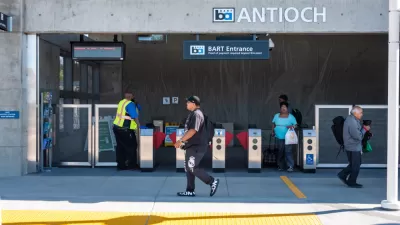In the Bay Area, where transit and cycling are encouraged and on the rise, cyclists are increasingly turning towards folding bikes to enjoy unrestricted access to the two major rail systems, BART and Caltrain, due to conventional bike limitations.
"Folding bikes are not the most chic thing. They are more practical," said BART spokesman Linton Johnson. "We are seeing a lot more people turning to bikes to save on a gallon of gas, and folding bikes are the way to go."
"[F]olding bikes can be taken on any BART train at any time, which is not the case with regular bikes, which are subject to restrictions at certain stations during commute hours.
Although folding bikes have been growing in popularity, they still account for only a very small segment of bike sales in the United States. Of the estimated 18 million new bikes sold in 2007, only about 100,000 were folding bikes, according to Jay Townley of Gluskin Townley Group, a bicycle marketing and research firm.
"The folding bike business is growing. We are looking at a major uptick this year," he said.
Townley said part of the increase is linked to rising gas prices - but another factor is the impact of the "new urbanism," which has led to more people choosing to live in denser urban areas that have transit-oriented developments and housing."
From SF Chronicle:
The Bay Area's other commuter rail system, Caltrain, while not have restrictions on bike access like BART, has its own problem of ‘bumping' which occurs when demand exceeds capacity. They have developed a new plan which includes "recommendations to set up a subsidy program to help people buy folding bikes that can be stowed under the seats " as well as other measures to accommodate cyclists. [See related links.]
Thanks to MTC-ABAG Library
FULL STORY: Folding bikes: a transit alternative

Maui's Vacation Rental Debate Turns Ugly
Verbal attacks, misinformation campaigns and fistfights plague a high-stakes debate to convert thousands of vacation rentals into long-term housing.

Planetizen Federal Action Tracker
A weekly monitor of how Trump’s orders and actions are impacting planners and planning in America.

Chicago’s Ghost Rails
Just beneath the surface of the modern city lie the remnants of its expansive early 20th-century streetcar system.

Bend, Oregon Zoning Reforms Prioritize Small-Scale Housing
The city altered its zoning code to allow multi-family housing and eliminated parking mandates citywide.

Amtrak Cutting Jobs, Funding to High-Speed Rail
The agency plans to cut 10 percent of its workforce and has confirmed it will not fund new high-speed rail projects.

LA Denies Basic Services to Unhoused Residents
The city has repeatedly failed to respond to requests for trash pickup at encampment sites, and eliminated a program that provided mobile showers and toilets.
Urban Design for Planners 1: Software Tools
This six-course series explores essential urban design concepts using open source software and equips planners with the tools they need to participate fully in the urban design process.
Planning for Universal Design
Learn the tools for implementing Universal Design in planning regulations.
planning NEXT
Appalachian Highlands Housing Partners
Mpact (founded as Rail~Volution)
City of Camden Redevelopment Agency
City of Astoria
City of Portland
City of Laramie




























